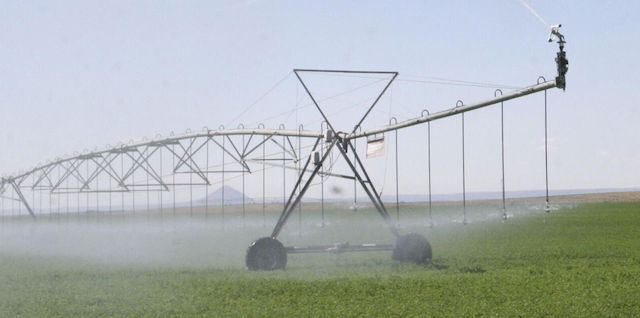Private Treaty February 2025
Pacific Cattle Angus, Sim-Angus, and Simmental range-raised production fall bulls available by PRIVATE TREATY FEBRUARY 2025 Carl Wisse • carl@pacificcattle.com www.pacificcattle.com • 509-539-6850 • Eltopia, WA
Published 7:34 am Wednesday, February 5, 2025

SALEM — Legislation requiring Oregon farms to report fertilizer use is meant to protect groundwater from pollution but critics say it’d only burden growers while generating useless data.
Supporters claim that Senate Bill 747 would inform regulatory decisions by requiring farms with more than 200 irrigated acres to disclose their fertilizer applications to the Oregon Department of Agriculture.
“This would exempt 90% of Oregon farms while covering 80% of irrigated farmland,” said Sen. Khan Pham, D-Portland, the bill’s chief sponsor.
Pham and other proponents say SB 747 is “not a punitive measure” but intends to gather information to prevent excessive fertilizer use, which can contaminate aquifers and end up in lakes and streams.
“Currently, we lack basic data about how much fertilizer is being applied to large farms,” said Omar Sandoval, a legislative aide who supports the bill.
Farmers subject to SB 747 would annually have to report the type and amount of fertilizer they’d applied to specific crops in each of their fields.
The ODA would then “identify persons who are overapplying fertilizer” and “take steps” to prevent excessive use in the future, both through “targeted education or technical assistance” and through enforcement processes.
“The purpose of this bill is very simply for the decisions to be informed and made well,” said Kaleb Lay, policy and research director for the Oregon Rural Action nonprofit.
However, critics of SB 747 argue that reporting fertilizer use will “accomplish nothing” without the context of soil class, topography, temperature and other factors that affect nutrient uptake by crops.
Even if growers were required to divulge these additional variables, critics say the ODA couldn’t possibly calculate the appropriate level of fertilizer for each field in Oregon without a massive investment of time and money.
“The fiscal impact should be fairly interesting to read,” said Rep. Anna Scharf, R-Amity, referring to the bill’s estimated financial effect on ODA.
The agency would “need to hire an army” of agronomists and other experts to analyze the data collected under SB 747, she said.
Meanwhile, the requirement would be “another nail in the coffin of Oregon agriculture” while still permitting excessive fertilizer use by homeowners and others, Scharf said.
“It’s time for us to stop pointing the finger at farmers at every chance we get,” she said.
Farmers who testified against the bill said it’s a “great example of regulation for the sake of regulation” that fails to recognize the complexity of fertilizer use.
“We have zero incentives to over-apply our fertilizer,” as it’s expensive and harms crops at high levels, said Michelle Armstrong-Zielinski, an agronomist who opposes the bill.
Though groundwater pollution has occurred in some regions of Oregon, the proposal “will do nothing to alleviate these problems” except weaken the agriculture industry, said Peter Kenagy, a grower near Albany, Ore.
“There is enough stuff driving people away from farming at this point that you have to back off on all the reporting requirements,” he said.